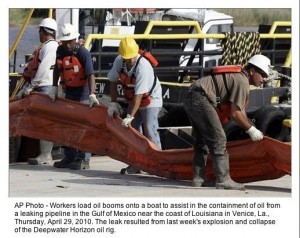Murphy’s Law and the Stupidity of Obama’s Drill-Drill-Drill Offshore Oil Policy
The murder of the oceans: chronicle of a death foretold.
Editors’ Note—Problems like these, which in reality have simple solutions, become as tough as advanced cancers when humanity attempts to control them using the rules of the capitalist system, which, incidentally, creates them in the first place. Leaving aside the scandalous question of why we still have cars that yield only 35 mpg average instead of hundreds of gallons, or why the world has not moved to a new energy paradigm away from oil, there should be an immediate embargo on all oil operations in oceans and lakes around the world. Period. In this, the US should be leading the charge instead of being the single most conspicuous violator of ecological prudence. Incidentally, following its by-now typical demagogic course, the Obama administration has declared that “no new drilling will be allowed offshore until a complete study is done on the BP oil spill.” At this stage in the evolution of the administration’s rhetoric, we should instantly recognize what this portends: more talk tough and do nothing. Like Aldous Huxley’s soma, the US political class long ago discovered the power of feeding p.r. to the masses, based on the sorry fact that a misinformed, atomized, and heavily indoctrinated public constantly looking out for their personal affairs is not likely to remember anything of importance beyond a fleeting moment of clarity. Thus when a man-made crisis as the one we witness now on the Gulf Coast strikes, a study is solemnly commissioned to avoid doing what is obvious and immediate, and then another study after that if necessary. In that cynical manner, decades can slip by without effective action. Then, as the fickle media focus moves on, and the public forgets, the malefactors get back to business as usual. And this, folks, is what passes for the best of all possible democracies, one we’re proud enough to export at gunpoint, if necessary.—P. Greanville
Dateline: April 28, 2010 [print_link]
By Dave Lindorff (with companion bonus piece by Marcus Baram, see below) // All annotated text by the editor in green.
President Obama claimed last month that off-shore drilling technology had become so advanced that oil spills and blowouts were a thing of the past. Of course, as he said this, Australia and Indonesia were still assessing the damage from a similar offshore oil platform, the Montana, in the Timor Sea, which blew out and poured millions of gallons of oil into the ocean off Western Australia for over three months before it could be sealed off.
Given that this is true, particular of complex technological enterprises, the question that needs to be asked is not, what is the probability of a catastrophic failure of an offshore well, but what is the potential damage in the event of even one such catastrophe for the local environment?
But the real lesson of the Deepwater Horizon is what it means for expanded drilling in the Arctic waters north of Alaska.
Oil companies, including BP, Exxon Mobil, Chevron, Shell and others, like Goldman traders looking at a tranch of subprime mortgages, are casting covetous eyes on the Arctic Ocean and the oil and gas that studies suggest lie under the virgin sea floor. Their plan is to drill for these hydrocarbons once the summer sea ice vanishes as a result of rising global temperatures (more about this in a future article).
Obama, as part of his opening of more coastal areas to drilling, is including areas of the Beaufort and Chukchi Seas, which are already ice free during summer.
But let’s think about this for a moment. Suppose there were a blowout like the one in the Gulf of Mexico at a rig drilling in the Arctic? Suppose it happened towards the end of the short summer, when the ice was about to return to cover the ocean surface? If it was a blowout that couldn’t be plugged, like the Montana blowout in the Timor Sea, or if the fail-safe system at the wellhead failed, as with the Deepwater Horizon, and if the only solution was, as with the Montana well, to drill new wells to ease the pressure on the blown well, how would this be done, once the ice moved in?
So why are we even talking about this?
I understand the problem, but it is solvable, by establishing refundable tax credits for low-income people who can document long commuting distances, for example.
CROSSPOSTED WITH COMMON DREAMS
http://www.commondreams.org/view/2010/04/28-2
••••
By Marcus Baram / Marcus@huffingtonpost.com | HuffPost Reporting
Gulf Oil Spill Exceeds BP’s ‘Worst-Case Scenario,’ Drilling Supporters On Defensive
First Posted: 04-29-10 11:00 AM | Updated: 04-29-10 05:00 PM
 The massive gush of oil spilling from the site of the rig that exploded last week exceeds the worst-case scenario predicted by oil giant BP when it filed its exploration plan with the government. The scale of the disaster is also having political repercussions, putting lawmakers who support offshore drilling on the defensive.
The massive gush of oil spilling from the site of the rig that exploded last week exceeds the worst-case scenario predicted by oil giant BP when it filed its exploration plan with the government. The scale of the disaster is also having political repercussions, putting lawmakers who support offshore drilling on the defensive.
But after the explosion, the scale of the accident required BP to get assistance from the Coast Guard, other federal agencies and other oil companies such as Shell, which is sending half a dozen vessels to help with the clean-up effort.
Spokespersons for BP and MMS did not return calls for comment.
Since the explosion, during which 11 workers were thrown overboard and are presumed dead, federal officials and members of Congress have launched several investigations into the incident and the role of BP and drilling contractor TransOcean.
[In a transparently hypocritical and self-serving gesture, Conservadem ] Sen. Mary Landrieu, a longtime supporter of offshore oil drilling, has called for a full investigation into the incident.
In two previous congressional hearings, Landrieu minimized the chance of such a massive accident occurring on an offshore oil rig and also minimized the impact of any oil spill, saying it would hardly fill one-third of the reflecting pool outside of the Capitol.
At a hearing last month held by the same committee to discuss drilling, Landrieu repeated her line about the reflecting pool, adding:
HuffPost asked Landrieu whether she still stands by her comments and whether she supports new safety regulations proposed by the federal agency that oversees offshore drilling, which are opposed by the oil industry, as first reported by HuffPost on Monday.
Senator Landrieu has been very supportive of Secretary Salazar and believes that the MMS and the Coast Guard have generally been good stewards of human safety with respect to the oil and gas industry. The Senator has said repeatedly that what happened in the Gulf last week is a tragedy and should be fully investigated to find out what went wrong and how it can be prevented in the future.
But she also firmly believes that this accident should not be used as an excuse to abandon plans to make America more energy secure.
Even with the development of alternative energy sources, the United States will still need oil into the foreseeable future. With no offshore domestic production, that oil would be tankered from overseas into the United States. The one thing we do know is that such a policy would do nothing to protect our shores. In fact, the National Academies of Science has found that while drilling and extraction account for less than 1 percent of all the oil that enters the marine environment, tankering accounts for four times that much.
[Running to cover her ass] Sen. Lisa Murkowski (R-Alaska), a longtime supporter of drilling offshore in her state, will hold a hearing next week on federal Outer Continental Shelf development plans:
•••
ALL ANNOTATIONS ARE ADDED BY THE EDITORS OF TGP, AND ARE NOT THE RESPONSIBILITY OF THE ORIGINAL AUTHORS

